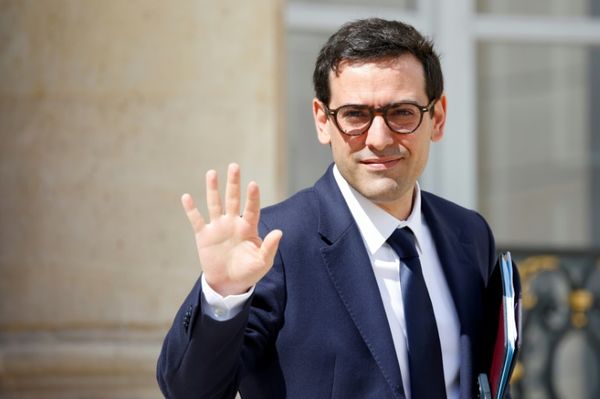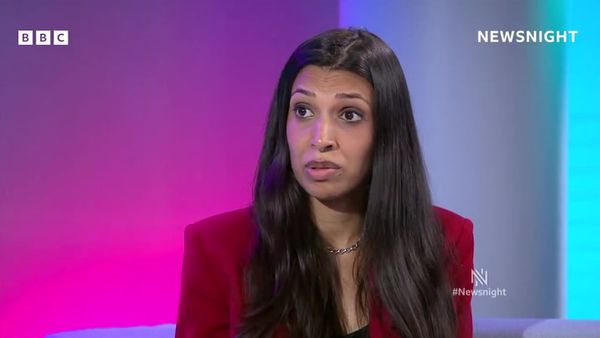
The corridors of a Berlin hospital are full of patients in various states of injury. Chaos reigns, with others pouring in after a fire at a local nightclub. Head doctor Zanna Parker calls her hands-off boss, Steffen Beck, to help her understaffed team get a grip on the situation. “What the hell is going on here?” he asks, annoyed at having had to interrupt his yoga exercises, as he runs down the stairs into the accident and emergency department.
Samuel Jefferson watches from the sidelines as the final scenes of his hospital TV show, Krank, are shot, as make-up artists scurry round, stretching fake silicone burns and blisters on to the limbs of the clubgoers, and a misty haze, to keep colours muted and the atmosphere edgy, is sprayed in the air.
“It’s been quite something to see it brought to life,” says the co-creator and head writer of this darkly comic docudrama, about to wrap after 75 days of shooting over four months.
The Harrogate-born former emergency doctor-turned-scriptwriter has collaborated with German-based film-makers to bring to the screen his creative take on the trauma of working in a hospital, based on his own UK experience, for an eight-episode TV series due to air next year.
Krank – the German word for sick, as well as weird, or freaky, which is also the acronym for the fictitious hospital in the melting-pot district of Neukölln – blends Jefferson’s real-life anecdotes of hospital life with those of German doctors who have shared their stories with him, acting as consultants on the show. It switches between drama, comedy and action, “all the joy of the world” of emergency medicine, as Jefferson puts it.

An graduate in screenwriting at the London Film School and the winner, for an A&E sitcom, of the Bafta Rocliffe New Writing Initiative, Jefferson, 36, said that for years, practising A&E medicine enabled him to pay for drama school. But the idea of weaving his experiences into his writing only came later.
“I was very resistant at first about doing a medical show because I needed to escape from that world … But I knew it was something I should do, because I knew it so well,” he told the Observer during a pause in filming over a bowl of goulash alongside the “injured” and medical staff.
The breakthrough came when he took the Serial Eyes course for European TV writers at the German Film and Television Academy in Berlin in 2018 and was introduced to producers Alexis von Wittgenstein and Gilda Weller of Violet Pictures, who were keen to make a “more authentic” hospital drama than the sterile, schmaltzy fare more typically on offer.
“Samuel was the perfect fit for us,” Von Wittgenstein says. “He was talented, had the experience as a doctor and the TV training, so we said let’s dare to do it. It was an advantage that he wasn’t German, that he brought in another cultural viewpoint and a different sense of humour. It turned out to be really enriching.”
Weller says Jefferson successfully combined the sad and funny in his writing, “a quality the British are particularly good at. His sense of humour was exceptional and so necessary.”
In the later stages of development a German writer was brought in to inject the translated script with the necessary amounts of infamous Berliner Schnauze – or snarling bluntness – and other colloquial, everyday language, to which Jefferson, now Berlin based but not a German speaker, did not have access.
At the start, he says, he had harboured the concern that he would be out of place in the German context.
“I was worried for a while about whether my experience in the UK could translate at all into the German market, or the experiences of its healthcare system.”
Despite Germany’s global reputation for having a slicker, more efficient and more effective health service than the UK’s, Jefferson said he soon recognised parallels with Britain’s overstretched, underfinanced, understaffed NHS, especially in the effect on the staff who work in it.
“Very quickly on meeting the people, I saw that the stress, pressure and bad ways of coping with this were identical and, weirdly, even though the hospital system functions differently in terms of how it gets its money [Germany’s is financed via statutory and private health insurance, the UK’s by taxation], the pressure on doctors, nurses and other staff, the lack of financing and long hours were all very similar. The stories were the same, including the way staff felt about the ‘clap for heroes’ campaign [‘don’t clap us, just pay us properly’], and in that way it felt very universal.”
He found that the jokes he plucked from real life and inserted into the script, such as: “What’s the difference between an A&E patient and a doctor? The patient gets to go home in the evening,” lost none of their meaning when translated into German.
Jefferson says despite his enduring affection for the NHS, he admits being misleadingly lured into medicine, like many of his counterparts, by the clean, glossy romance of medical dramas such as the US series Grey’s Anatomy. Once inside, he very quickly became disillusioned, in particular by its corporatisation.
“I remember one shift in A&E when a nurse handed out some feedback flyers to patients, and the first question was: ‘Would you recommend this emergency department to your friends and family?’ It was such a clear demonstration to me of the capitalisation of the system in the UK.”
He was shocked to find that, despite its good reputation, this was built into the German healthcare system, too. “Operations are regularly performed that are not necessary, in order to make money,” he says, touching on an oft-discussed and frowned-upon phenomenon in Germany.
In Germany, hospital doctors in particular are given considerable financial incentives to offer superfluous or extraneous treatments, which may put patients at unnecessary risk but boost hospital finances.
“This makes sense, in a zoomed-out way, to finance the system,” says Jefferson, “but the very act of looking your patient in the eye and telling them: ‘You need an operation’, when they don’t, goes against everything I think being a doctor should be about.”

There has been growing political pressure in recent years for the introduction of hospital reforms to reduce these incentives. This issue is heavily woven into the plot of Krank, creating friction between Parker, the head doctor, and Ben Weber, who rebelliously seeks to torpedo the attempts of his new boss to push through procedures in order to boost revenue and keep the status quo.
The BBC comedy drama This Is Going to Hurt, based on Adam Kay’s diary-style account of his time as a junior NHS doctor, premiered on the BBC shortly after Krank had gone into development, Jefferson says.
“Kay had the courage to leave the profession and reflect on it, and for that I admire him”.
Jefferson takes the Observer around the sprawling SEZ, a now abandoned, once feverishly popular communist East German leisure centre, in which the set for Krank has been built, making use of its garish 1970s colours and its yellow former skating rink, which is the ambulance forecourt.
A red plastic seal stranded in the pool, sprinkled with the droppings of the racoons and foxes that have long since made the brutalist 1970s building their home, a row of mouldy beach chairs sinking into themselves and the constant drip of water from the leaky roof are stark reminders that it has seen better days.
“It has often felt to us like a character in its own right in our drama,” says Jefferson.







